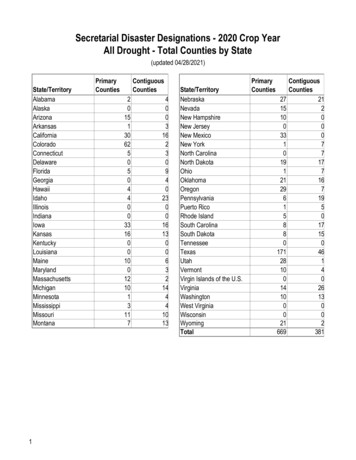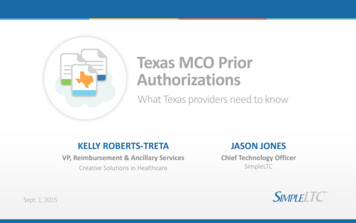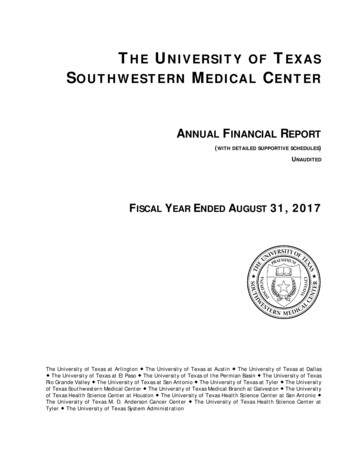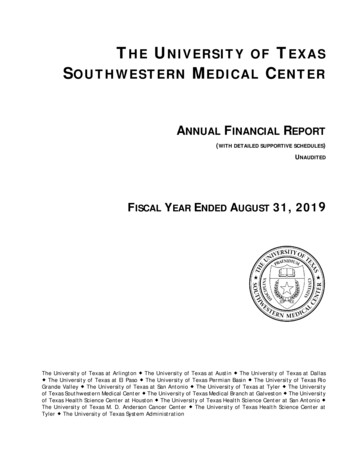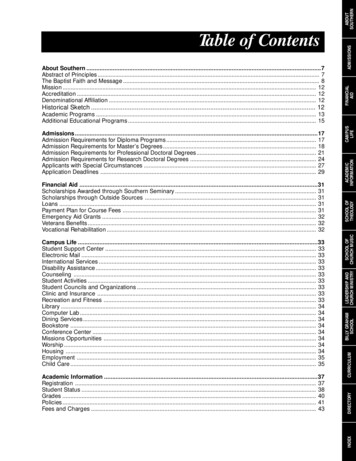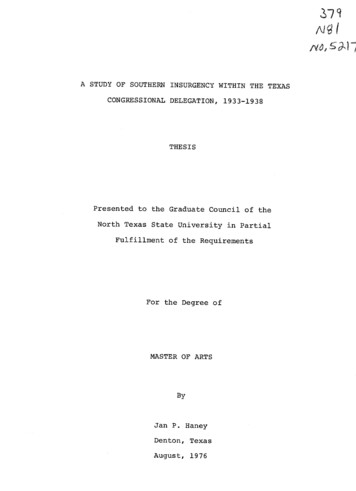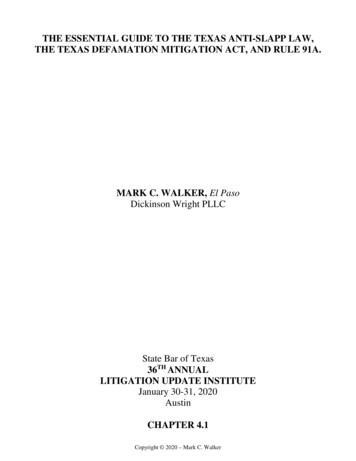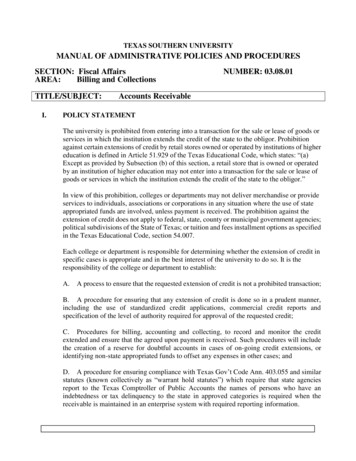
Transcription
TEXAS SOUTHERN UNIVERSITYMANUAL OF ADMINISTRATIVE POLICIES AND PROCEDURESSECTION: Fiscal AffairsAREA:Billing and CollectionsTITLE/SUBJECT:I.NUMBER: 03.08.01Accounts ReceivablePOLICY STATEMENTThe university is prohibited from entering into a transaction for the sale or lease of goods orservices in which the institution extends the credit of the state to the obligor. Prohibitionagainst certain extensions of credit by retail stores owned or operated by institutions of highereducation is defined in Article 51.929 of the Texas Educational Code, which states: “(a)Except as provided by Subsection (b) of this section, a retail store that is owned or operatedby an institution of higher education may not enter into a transaction for the sale or lease ofgoods or services in which the institution extends the credit of the state to the obligor.”In view of this prohibition, colleges or departments may not deliver merchandise or provideservices to individuals, associations or corporations in any situation where the use of stateappropriated funds are involved, unless payment is received. The prohibition against theextension of credit does not apply to federal, state, county or municipal government agencies;political subdivisions of the State of Texas; or tuition and fees installment options as specifiedin the Texas Educational Code, section 54.007.Each college or department is responsible for determining whether the extension of credit inspecific cases is appropriate and in the best interest of the university to do so. It is theresponsibility of the college or department to establish:A.A process to ensure that the requested extension of credit is not a prohibited transaction;B. A procedure for ensuring that any extension of credit is done so in a prudent manner,including the use of standardized credit applications, commercial credit reports andspecification of the level of authority required for approval of the requested credit;C. Procedures for billing, accounting and collecting, to record and monitor the creditextended and ensure that the agreed upon payment is received. Such procedures will includethe creation of a reserve for doubtful accounts in cases of on-going credit extensions, oridentifying non-state appropriated funds to offset any expenses in other cases; andD. A procedure for ensuring compliance with Texas Gov’t Code Ann. 403.055 and similarstatutes (known collectively as “warrant hold statutes”) which require that state agenciesreport to the Texas Comptroller of Public Accounts the names of persons who have anindebtedness or tax delinquency to the state in approved categories is required when thereceivable is maintained in an enterprise system with required reporting information.
II.PURPOSE AND SCOPEThis document establishes guidelines for the prudent extension of credit where deemedpermissible and in the best interest of the Texas Southern University.III.IV.1.DEFINITIONSA.Debtor: Entity purchasing goods or services on credit (i.e., the buyer).B.Creditor: Entity selling goods or services on credit (i.e., TSU department).C.Account Receivable: An asset that represents a claim against another entity for goodsor services that have been provided, but for which cash has not been received.POLICY PROVISIONSCRITERIA FOR RECOGNIZING AN ACCOUNT RECEIVABLEAn account receivable may be recognized if:A.The buyer of the goods or service is not another TSU department.B.The buyer of the goods or services has entered into a legally binding agreementto purchase the goods.C.The goods or services have been delivered to the buyer by the seller.D.Payment is due to the seller from the buyer.E.The revenue from the transaction has been recognized in the seller’s books andrecords.F.The cash payment has not been received (collected) by the seller from the buyer.G.Total outstanding accounts receivable for a department are deemed by the VicePresident of Administration & Finance/CFO to be material to the financial records ofthe department and thus to the university.H.law.The accounts receivable does not represent an extension of credit prohibited byI.The recording is deemed to be appropriate by the university’s accountingofficers.
2.RECORDING AN ACCOUNT RECEIVABLEAccounts receivable are recorded in the university financial system by journal entryprepared by the department and submitted to General Accounting with the appropriatesupporting documentation or fed to the university financial system from the student subledger for student receivables. These entries credit the appropriate revenue account anddebit the appropriate accounts receivable account in the department’s general ledgerFOPA. The credit may go to more than one revenue account, and if the sale is subject tostate and local sales tax, the tax liability must be recognized at the time the revenue isrecognized (i.e., the sales tax account control must be credited for the appropriateamount given the amount of the taxable sale ).In the event that goods sold on account are returned, the accounts receivable outstandingbalance is reduced by the amount of the return using a journal entry. The receivable iscredited, and the revenue is debited (and, if applicable, the sales tax is debited for theappropriate amount).3.AGING, COLLECTING, AND RECONCILING ACCOUNTS RECEIVABLEAll departments recording accounts receivable in the financial system must maintainadequate records of those accounts.Departments will reconcile the departmental records to the financial system monthly.Departments will maintain a record of the monthly accounts receivable reconciliationand make available to General Accounting or internal audit upon request.Departments must also maintain an aging schedule for all accounts receivable, with thetotal of the aging schedule balanced to the total recorded accounts receivable. Thefollowing standard aging brackets are to be used:0316191121181361721ToToToToToToToTo30 days60 days90 days120 days180 days360 days720 days1080 daysThe department recording the accounts receivable has the sole responsibility forcollecting the account. The department must have a documented collection procedure inplace and on file and made available to General Accounting upon request. A suggestedschedule of activities for this procedure includes:
Aging BracketRecommended Collection Activity31 to 60 daysSend copy of invoice via email with 30 day dunning message61 to 90 daysSend copy of invoice via email with 60 day dunning message91 to 120 daysSend copy of invoice via email with 90 day dunning message121 to 150 daysSend copy of invoice via email with 120 day dunning message.151 to 180 daysSend copy of invoice via email with 150 day dunning message.Final collection letter mailed to account holder.Over 181 daysAccount submitted to university’s collection agency.All collection activity must be logged and copies kept of all letters sent to the debtor.4.WRITE-OFF OF AN UNCOLLECTIBLE ACCOUNTAll accounts receivable to be written off are approved by the Board of Regents (“Board")of Texas Southern University. The Office of Student Accounting will compile a list ofall such accounts receivable for submission to the Board. Accounts receivable areeligible for write-off once they have been outstanding for 1080 days (three years) withno payment activity. To be considered for write off, the department must demonstratethat adequate steps were taken to collect the amount due.Departments with uncollected accounts receivable meeting the criteria for write-off willsubmit a list of individual accounts to be written-off and a current reconciliation of thedepartment’s accounts receivable to General Accounting. Each individual account to bewritten-off must be supported by a copy of the original invoice and copies of thecollection activity log and all correspondence relating to the collection activities for theaccount.After approval has been obtained from the Board of Regents, the department businessmanager (and certifying signatory) initiates the journal entry with the account to bedebited for the write-off, and departments with a bad debt reserve (see section 6 below)will use that account for the write-off (debit). The journal entry must be submitted toGeneral Accounting for posting.5.FORGIVENESS OF DEBT VERSUS WRITE-OFF OF UNCOLLECTEDACCOUNTSThe write-off of an uncollected account is a bookkeeping entry only and does not relievethe debtor from financial responsibility to the university. Although the uncollectedaccount has been removed from the books and records, the university may still have aclaim against the debtor and may still seek legal remedy (e.g., sue for collection in a
court of law). Therefore, it is the responsibility of each department to maintain adequaterecords regarding legal financial obligations (i.e., debts) owed to the university.Departments that wish to forgive a debtor’s obligation to the university shall seek advicefrom the university Office of General Counsel and the Vice President of Administration& Finance/CFO regarding any special tax consequences relating to the forgiveness ofdebt.6.ESTABLISHING AN ALLOWANCE FOR DOUBTFUL ACCOUNTSAccounts receivable are reported in the financial statements at their net realizable value.Net realizable value is the gross amount of receivables less an allowance estimated foraccounts that may become totally or partially uncollectable.When accounts receivable are considered material to the institution’s financialstatements, departments will establish an allowance for uncollectible accounts.Based on historical collection rates of the institution, allowance for doubtful accountsshould be calculated using the following minimum percentages:Days Past Due0-360 days361-720 days720-1080 days1081 daysPercentageUncollectible10%90%90%100%If a department can document an uncollectible rate significantly different from theinstitution’s history, that department may be permitted to establish a reserve based ontheir prior experience.Departments with recurring write-offs of uncollected accounts should contact GeneralAccounting for assistance in establishing a reserve for bad debts.
V.APPROVALSChristina Ordonez-Campos, CPAControllerKenneth HuewittVice President of Administration & Finance/CFOPresidentEffective Date5/9/2018
Departments will maintain a record of the monthly accounts receivable reconciliation and make available to General Accounting or internal audit upon request. Departments must also maintain an aging schedule for all accounts receivable, with the total of the aging schedule balanced to the total recorded accounts receivable. The
